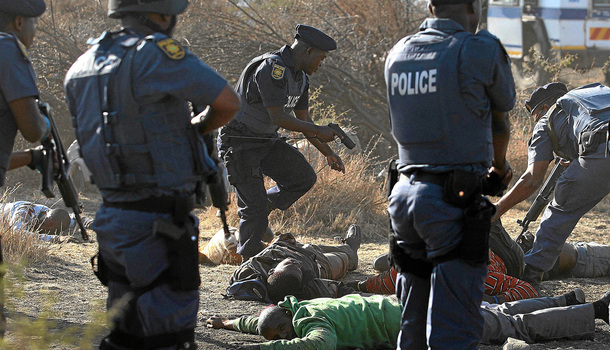In South Africa, the mining crisis unfolds. What happened at Marikana, where 34 miners died at the hands of police? Prosecutors today charged all the miners arrested that day with causing their own killings, using an archaic piece of Dutch law often used under apartheid. Even the government Justice minister was taken aback and has demanded an explanation. Now the police say to us: “you have arrested yourself for failing not to see that there is nothing to see here.” It’s that absurd and authoritarian at once. Call it neocolonial Stalinism.
It’s becoming clear that controlling this narrative is about far more than the already-serious specific situation. This is about who tells the story of “globalization.” Is it about “wealth” or “life”? And whose wealth and whose lives count.
Announcing the extraordinary decision to prosecute all the miners, Frank Lesenyego, spokesman for the National Prosecuting Authority, said:
It’s the police who were shooting, but they were under attack by the protesters, who were armed, so today the 270 accused are charged with the murders.
The astonishing accusation is based on the charge of “common purpose,” a device of authority to reduce individuals to a mass. It explains why the NPA has kept the miners in jail for over two weeks without charge, against South African law. It’s sad to see the postcolonial government act so directly in the interest of the transnational mining company–and perhaps also its own client trade unions.
All of this bolsters the now-established media narrative that the miners charged police and it was in the ensuing chaos that people died. The South African government argues that the police acted in self defense, despite the fact that no police officer was injured on that day. It has also been argued that the miners were trying to evade tear gas and live ammunition fire.
Crucially, however, only ten of the 34 deaths occurred in this direct conflict. Where were the others? South Africa’s Mail and Guardian reports:
Some of the miners killed in the August 16 massacre at Marikana appear to have been shot at close range or crushed by police vehicles. They were not caught in a fusillade of gunfire from police defending themselves, as the official account would have it.
The analysis is based on a reconstruction of the scene at a location out of view of press cameras on the day of the massacre, using forensic analysis and interviews conducted by University of Johannesburg researchers. At least 14 death sites have been identified here, and witnesses talk of armored vehicles driving over people as they lay on the ground. It is impossible, then, to sustain an accusation of common purpose that retains any logical sense.
Greg Marinovich concludes at the end of his long article that what happened was
summary and entirely arbitrary execution at the hands of a paramilitary police unit.
Why use such force? The situation in South Africa, and indeed the global South, is at the brink. Even Zwelinzima Vavi, the head of COSATU, the official trade union group that has been seen as hostile to the radical miners’ breakaway union, pointd out
We have been warning about a ticking time bomb for years, saying that if we don’t address the current levels of unemployment, poverty and inequalities at some point, the poor and those who are feeling the pinch will march to our own boardrooms to demand that we do something about their circumstances.
Yesterday, Julius Malema spoke to miners at a gold mine, partly owned by President Zuma, who have not been paid for over two years:
Our leaders have lost their way and have been co-opted by mine owners and fed profits. They don’t care about you.
His stump speech now dwells on the disappointment felt by rank-and-file ANC members and black South Africans about the lack of progress since 1994. He calls for nationalizing the mines and the establishment of a living wage for all at R12,500, about $4000. The messenger may not be well liked but the message is powerful. At the Gold Fields Mine, the world’s fourth largest, a quarter of the miners are on wildcat strike as of today. All the Gold Standard discussion so common among monetary geeks forgets the appalling labor of colonial gold mines from the Spanish empire in the “New World,” via Africa’s so-called Gold Coast to present-day “neo-colonial” transnational mining.
US readers: remember that Ohio coal miners were not only required to attend a Mitt Romney rally, they had to lose a day’s pay to do so. Going for Obama then? As Republicans sing the praises of coal, Democrats drill for oil. Ken Salazar yesterday gave Shell the go-ahead to drill in the Arctic even though its own safety vessel isn’t finished. What could go wrong with that idea?
The so-called globalization of the past thirty years has allowed the global one per cent to treat the finite human and non-human resources of the planet as its own expense account. Can a decolonial, life-first counterimaginary be created? Doing so would mean not nationalizing mines but closing them and providing a living wage for all nonetheless.

